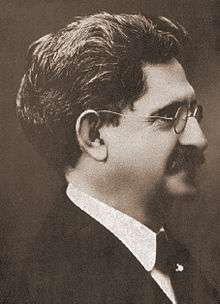Arena Publishing Co.
Arena Publishing Company was an American book and magazine publishing firm of the late 19th century, founded by author and editor B. O. Flower.[1]

Company history

Headquartered in Copley Square in Boston, the firm specialized in fiction and non-fiction books on the progressive causes of the 1890s. Though in existence for only a short period, from 1890 to 1896, Arena issued books by several important progressive figures of the time.[2] The firm has been called "the notoriously radical Arena Publishing Company."[3]
Arena released books on political and economic reform and progressive religious movements (including books written by Flower). The company's promotional materials advertised "important books for thoughtful people" on "progressive modern thought and effort." It issued a number of the utopian novels that were a prominent feature of American literature in the late 19th century,[4][5] along with related speculative and science fiction. "Arena Publishing Company of Boston published twenty or more fantastic fiction volumes between 1892 and 1896."[6] Gustavus W. Pope's Journey to Venus the Primeval World; Its Wonderful Creations and Gigantic Monsters (1895) is one example.
Noteworthy Arena writers and books:
- Hamlin Garland, Main-Travelled Roads (1891)
- Hamlin Garland, A Spoil of Office (1892)
- Hamlin Garland, Jason Edward (1892)
- Byron Brooks, Earth Revisited (1892)
- Alice Ilgenfritz Jones and Ella Merchant, Unveiling a Parallel (1893)
- Elbert Hubbard, One Day: A Tale of the Prairies (1893)
- Elbert Hubbard, Forbes of Harvard (1894)
- Solomon Schindler, Young West (1894)
- Castello Holford, Aristopia (1895)
- John McCoy, A Prophetic Romance (1896)
- William D. McCrackan, The Rise of the Swiss Republic (1892)
The firm's radicalism reached even into the format of its books. Flower believed that the standard printing format of black ink on white paper caused eyestrain; Schindler's Young West, a sequel to Edward Bellamy's famous Looking Backward, was issued with colored borders, that varied among blue, green, and yellow page margins.[7]
Arena also produced popular fiction that concerned socially progressive issues. The titles and authors are now largely forgotten; Helen H. Gardener's feminist novel Pray You, Sir, Whose Daughter? (1892) and M. L. Cowles's Redpath: Life on a Southern Plantation (1893) are not unrepresentative. Flower nourished an interest in spiritualism — he served on the board of directors of the American Psychical Society — and published spiritual novels like Mary Clay Knapp's Whose Soul Have I Now? (1896).
Along with its books, the firm also published a monthly journal titled The Arena, edited by Flower, which called itself "the leading progressive review of the world." The journal featured articles and essays by the company's authors, like Garland and Schindler, plus early work by Frank Norris, Stephen Crane, and Upton Sinclair.[8] It reached a circulation of 30,000 copies. When the company folded in 1896 due to debts and lawsuits, the journal continued to publish under other management.
Footnotes
- American Antiquarian Society and Research Libraries group, Bibliography of American Imprints to 1901, New York, K. G. Saur, 1993.
- Roger Eliot Stoddard, "Vanity and Reform: B. O. Flower's Arena Publishing Company, Boston, 1890–1896," Papers of the Bibliographical Society of America, Vol. 76 No. 3 (1982), pp. 273-337.
- Donald Pizer, Hamlin Garland's Early Work and Career. Berkeley, CA: University of California Publications, 1960; pg. 144.
- Kenneth M. Roemer, The Obsolete Necessity: America in Utopian Writings, 1888–1900, Kent, OH, Kent State University Press, 1976.
- Jean Pfaelzer, The Utopian Novel in America, 1886–1896: The Politics of Form, Pittsburgh, University of Pittsburgh Press, 1984.
- James Gunn, The New Encyclopedia of Science Fiction, New York, Viking, 1988; p. 373.
- Arthur Mann, "Solomon Schindler: Boston Radical," The New England Quarterly, Vol. 23 No. 4 (December 1950), pp. 453-76; see p. 471.
- Stanley Wertheim, A Stephen Crane Encyclopedia, Westport, CT, Greenwood Press, 1997; p. 109.
Further reading
- The Arena. Boston: Arena Publishing Co.; New York: Alliance Publishing Co.; Trenton, NJ: Albert Brandt, 1889-1909. Vol. 1 | Vol. 2 | Vol. 3 | Vol. 4 | Vol. 5 | Vol. 6 | Vol. 7 | Vol. 8 | Vol. 9 | Vol. 10 | Vol. 11 | Vol. 12 | Vol. 13 | Vol. 14 | Vol. 15 | Vol. 16 | Vol. 17 | Vol. 18 | Vol. 19 | Vol. 20 | Vol. 21 | Vol. 22 | Vol. 23 | Vol. 24 | Vol. 25 | Vol. 26 | Vol. 27 | Vol. 28 | Vol. 29 | Vol. 30 | Vol. 31 | Vol. 32 | Vol. 33 | Vol. 34 | Vol. 35 | Vol. 36 | Vol. 37 | Vol. 38 | Vol. 39 | Vol. 40 | Vol. 41 |